 9 citations,
July 2020 in “Biomedicine & Pharmacotherapy”
9 citations,
July 2020 in “Biomedicine & Pharmacotherapy” Mitochondrial therapy and platelet-rich plasma therapy both stimulated hair regrowth in aging mice, with mitochondrial therapy showing similar effectiveness to plasma therapy.
 8 citations,
December 2015 in “Daehan han'yi hag'hoeji/Journal of Korean medicine”
8 citations,
December 2015 in “Daehan han'yi hag'hoeji/Journal of Korean medicine” Transtherapy significantly improved moderate to severe acne scars without side effects.
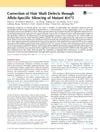 6 citations,
September 2015 in “Journal of Investigative Dermatology”
6 citations,
September 2015 in “Journal of Investigative Dermatology” Using special RNA to target a mutant gene fixed hair problems in mice.
 5 citations,
July 2003 in “Drug Development Research”
5 citations,
July 2003 in “Drug Development Research” Fluridil promotes hair growth safely and effectively for androgenetic alopecia.
 3 citations,
July 2018 in “Elsevier eBooks”
3 citations,
July 2018 in “Elsevier eBooks” Erosive pustular dermatosis of the scalp is a rare condition that causes scarring hair loss, mainly in older women, and requires ongoing treatment.
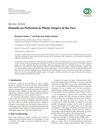 3 citations,
January 2018 in “BioMed Research International”
3 citations,
January 2018 in “BioMed Research International” Achieving perfect facial plastic surgery requires personalized plans, proper patient selection, advanced techniques, and ongoing surgeon education.
 April 2018 in “Journal of Investigative Dermatology”
April 2018 in “Journal of Investigative Dermatology” Glycogen metabolism is important for energy and processes in human hair follicles, and hair follicles may produce glucose from lactate.
 271 citations,
May 2019 in “Cells”
271 citations,
May 2019 in “Cells” The secretome from mesenchymal stem cells is a promising treatment that may repair tissue and avoid side effects of stem cell transplantation.
 27 citations,
June 2015 in “Revista Brasileira de Farmacognosia”
27 citations,
June 2015 in “Revista Brasileira de Farmacognosia” Safflower has been used in traditional medicine for centuries and shows promise in treating heart, brain, and inflammatory conditions, but more research is needed to ensure its safety.
 10 citations,
January 2007 in “Dermatologic Surgery”
10 citations,
January 2007 in “Dermatologic Surgery” Artificial hair fibers help treat scalp scars with few complications and a 20% yearly fiber fall rate.
 7 citations,
January 2013 in “BioMed research international”
7 citations,
January 2013 in “BioMed research international” Hair follicles and deer antlers regenerate similarly through stem cells and are influenced by hormones and growth factors.
 1 citations,
September 2023 in “Clinical, cosmetic and investigational dermatology”
1 citations,
September 2023 in “Clinical, cosmetic and investigational dermatology” Certain genetic variants linked to immune response increase the risk of alopecia areata in Taiwanese people.
 January 2007 in “Dermatologic Surgery”
January 2007 in “Dermatologic Surgery” Artificial hair fibers help treat scalp scars with few complications and a 20% yearly fiber fall rate.
 106 citations,
December 2015 in “Journal of The American Academy of Dermatology”
106 citations,
December 2015 in “Journal of The American Academy of Dermatology” Correct skin biopsy techniques are crucial to avoid misdiagnosis of skin diseases.
 13 citations,
March 2013 in “Dermatologic Surgery”
13 citations,
March 2013 in “Dermatologic Surgery” The document concludes that hair restoration has advanced significantly, with FUE becoming more popular, and stresses the importance of physician training and ethical practices in the field.
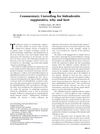 17 citations,
August 2010 in “Journal of the American Academy of Dermatology”
17 citations,
August 2010 in “Journal of the American Academy of Dermatology” Unroofing is an effective, less invasive, and cost-effective surgery for hidradenitis suppurativa with low recurrence and improved patient quality of life.
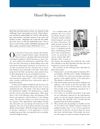 16 citations,
December 2004 in “Aesthetic surgery journal”
16 citations,
December 2004 in “Aesthetic surgery journal” The hand rejuvenation method makes hands look younger by improving skin and filling out tissues.
 391 citations,
January 2010 in “Journal of The American Academy of Dermatology”
391 citations,
January 2010 in “Journal of The American Academy of Dermatology” Half of people with Alopecia Areata may see hair regrowth within a year without treatment, but recovery is unpredictable.
 4 citations,
July 1992 in “Clinics in Dermatology”
4 citations,
July 1992 in “Clinics in Dermatology” Skin surgery has significantly advanced since 1950, with improvements in chemical peels, hair restoration, lasers, and Mohs surgery, and the development of less invasive techniques and specialized training.
 63 citations,
May 2000 in “Australasian Journal of Dermatology”
63 citations,
May 2000 in “Australasian Journal of Dermatology” Chemotherapy and bone marrow transplant can cause permanent hair loss.
 1 citations,
August 2013 in “Facial Plastic Surgery Clinics of North America”
1 citations,
August 2013 in “Facial Plastic Surgery Clinics of North America” Hair restoration has evolved into a refined art, providing happiness to patients and doctors.
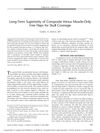 May 2004 in “Annals of Plastic Surgery”
May 2004 in “Annals of Plastic Surgery” Muscle-only free flaps for skull coverage have more long-term complications than composite flaps.
 December 2020 in “Journal of Aesthetic Nursing”
December 2020 in “Journal of Aesthetic Nursing” Injecting platelet-rich plasma into the scalp stimulates hair growth, increases hair density, and treats hair loss effectively with minimal side effects.
 32 citations,
January 2017 in “Orphanet journal of rare diseases”
32 citations,
January 2017 in “Orphanet journal of rare diseases” FOXN1 gene mutations cause a rare, severe immune disease treatable with cell or tissue transplants.
 16 citations,
January 2013 in “Indian Journal of Dermatology, Venereology and Leprology”
16 citations,
January 2013 in “Indian Journal of Dermatology, Venereology and Leprology” New treatments and early diagnosis methods for permanent hair loss due to scar tissue are important for managing its psychological effects.
 11 citations,
January 2000 in “Journal of Cutaneous Pathology”
11 citations,
January 2000 in “Journal of Cutaneous Pathology” Short telomeres contribute to aging and cancer, and while telomerase can delay aging, it may also promote cancer.
 4 citations,
April 2014 in “Journal of Pharmacology and Pharmacotherapeutics”
4 citations,
April 2014 in “Journal of Pharmacology and Pharmacotherapeutics” The boy's hair loss was caused by the tuberculosis drug isoniazid but grew back after stopping the medication.
 6 citations,
January 2018 in “Annals of dermatology/Annals of Dermatology”
6 citations,
January 2018 in “Annals of dermatology/Annals of Dermatology” Hyaluronic acid filler can safely and effectively improve facial contour in Parry-Romberg Syndrome.
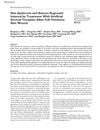 1 citations,
January 2019 in “The International Journal of Lower Extremity Wounds”
1 citations,
January 2019 in “The International Journal of Lower Extremity Wounds” Artificial dermal template treatment can stimulate complete skin and hair follicle regrowth.
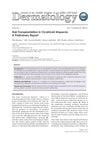 January 2014 in “Journal of the turkish academy of dermatology”
January 2014 in “Journal of the turkish academy of dermatology” Hair transplantation is safe and effective for permanent hair loss due to scarring, with high patient satisfaction.





























